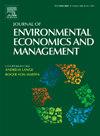空气污染对劳动力供给的影响:来自日本的证据
IF 5.9
3区 经济学
Q1 BUSINESS
Journal of Environmental Economics and Management
Pub Date : 2025-04-29
DOI:10.1016/j.jeem.2025.103178
引用次数: 0
摘要
我们基于日本的数据实证检验了细颗粒物(PM2.5)污染对劳动力供给的影响,日本的PM2.5水平普遍处于低至中等水平。PM2.5会对健康产生不利影响,导致受影响的工人减少劳动力供应,而工人和企业可以采取应对措施,减轻劳动力供应损失。我们的目标是研究PM2.5污染的因果效应,通过使用具有全国代表性的面板数据和利用两种外源现象:热逆温事件和来自亚洲大陆的跨界污染运输来管理PM2.5污染的潜在内生性。结果有力地表明,PM2.5水平的增加会减少月劳动时间。即使是中等水平的PM2.5污染也会影响全国范围内的劳动力供应。我们的发现与当前国际上关于中低水平空气污染的讨论有关。本文章由计算机程序翻译,如有差异,请以英文原文为准。
Effects of air pollution on labor supply: Evidence from Japan
We empirically examine the effects of fine particulate matter (PM2.5) pollution on labor supply based on data from Japan, a country in which the PM2.5 level is generally low to moderate. PM2.5 can adversely affect health and cause affected workers to reduce labor supply, whereas workers and firms can take reactive measures to mitigate labor supply losses. We aim to investigate the causal effects of PM2.5 pollution, managing potential endogeneity of PM2.5 pollution by using nationally representative panel data and utilizing two exogenous phenomena: thermal inversion events and transboundary pollution transport from the Asian continent. The results robustly show that increases in PM2.5 levels decrease monthly labor hours. Even moderate levels of PM2.5 pollution affect labor supply on a national scale. Our findings are related to current international discussions on low-to-moderate levels of air pollution.
求助全文
通过发布文献求助,成功后即可免费获取论文全文。
去求助
来源期刊
CiteScore
8.00
自引率
4.30%
发文量
91
期刊介绍:
The Journal of Environmental Economics and Management publishes theoretical and empirical papers devoted to specific natural resources and environmental issues. For consideration, papers should (1) contain a substantial element embodying the linkage between economic systems and environmental and natural resources systems or (2) be of substantial importance in understanding the management and/or social control of the economy in its relations with the natural environment. Although the general orientation of the journal is toward economics, interdisciplinary papers by researchers in other fields of interest to resource and environmental economists will be welcomed.

 求助内容:
求助内容: 应助结果提醒方式:
应助结果提醒方式:


